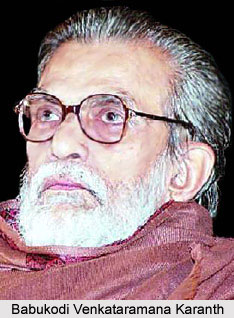 Babukodi Venkataramana Karanth is a popular name in contemporary Indian theatre. Popularly known as B. V. Karanth, was nationally recognized for the rich variety and high quality of his achievements in various languages. He was also famous for directing plays, composing music, conducting workshops, translating or adapting, and heading prominent cultural organizations. He also directed such important films as Vamsha vriksha i.e. `Family Tree`, with Girish Karnad in 1971 and Chomana dudi i.e. `Choma`s Drum in 1975. B. V. Karanth also scored music for cine directors like Mrinal Sen and Girish Kasaravalli, and contributed significantly to children`s Theatre.
Babukodi Venkataramana Karanth is a popular name in contemporary Indian theatre. Popularly known as B. V. Karanth, was nationally recognized for the rich variety and high quality of his achievements in various languages. He was also famous for directing plays, composing music, conducting workshops, translating or adapting, and heading prominent cultural organizations. He also directed such important films as Vamsha vriksha i.e. `Family Tree`, with Girish Karnad in 1971 and Chomana dudi i.e. `Choma`s Drum in 1975. B. V. Karanth also scored music for cine directors like Mrinal Sen and Girish Kasaravalli, and contributed significantly to children`s Theatre.
Babukodi Venkataramana Karanth was born in Manchi, in 1929. That is a small village in Dakshin Kannad district of Karnataka. Karanth first acted in the title role of Kuvempu`s Nanna Gopala i.e. "My Gopala" at the age of 7. While still in school, he left home to join Gubbi H. Veeranna`s company named Gubbi Company in 1944. He was there for six years. After this, he developed his interests in theatre, music, and literature. Gubbi sent him to Varanasi for higher studies. There he completed his MA in Hindi language at Banaras Hindu University and learnt classical music from Pandit Omkarnath Thakur. Subsequently, he enrolled at the newly established National School of Drama (NSD), worked in Delhi for a while as a school teacher and participated in theatre with Dishantar, and came back to his home state in the late 1960s.
By that time, a new theatre movement was taking shape in Karnataka of which he first became a catalyst and later a protagonist. From 1967, Babukodi Venkataramana Karanth directed plays, often at a feverish pace, travelled to different parts of Karnataka, and soon created a large following for his brand of theatre and music. The festival of plays he directed in Bengaluru during 1972 stands as a landmark in Kannada Theatre. By 1977, he was well known outside the Indian state of Karnataka and was nominated Director of the NSD during 1977-81.
Afterwards B. V. Karanth headed the Rangmandal in Bhopal during 1981-6 and Rangayana in Mysore during 1989-95, building up these repertories from the base. His major productions include Sircar`s Evam Indrajit in Bengaluru in 1969, Kambar`s Jokumaraswami in Bengaluru in 1972, Karnad`s Hayavadana in Bengaluru in 1973, G. B. Joshi`s Sattavara neralu i.e. `Shadow of the Dead` in Bengaluru in 1975. Some of the others can be mentioned as Shakespeare`s Macbeth as Barnam vana i.e. `Barnam Forest` in New Delhi in 1979, Tendulkar`s Ghashiram Kotwal in Bhopal in 1982, and P. T. Narasimhachar`s Gokula nirgamana i.e. `Departure from Gokula` in Heggodu in 1993.
The significance of Karanth`s work in Kannada theatre lies in three areas. First, he rescued the arid amateur theatre by bringing celebration and theatricality back into it. Second, he invented an intuitive synthesis of the best of Company Nataka, amateur experimentation, and folk forms like Yakshagana and that too inspiring a fashion for nativism. Third, in theatre music, he achieved an inimitable balance between song and speech, melody and meaning. His movie Chomana Dudi won many national and international awards including National Award for "Best Film". The Government of India honoured him with the Padma Shri.
B. V. Karanth was settled in Bengaluru in his later stage, freelancing as feverishly as when he began his career. He died in 2002 at the age of 73.




















